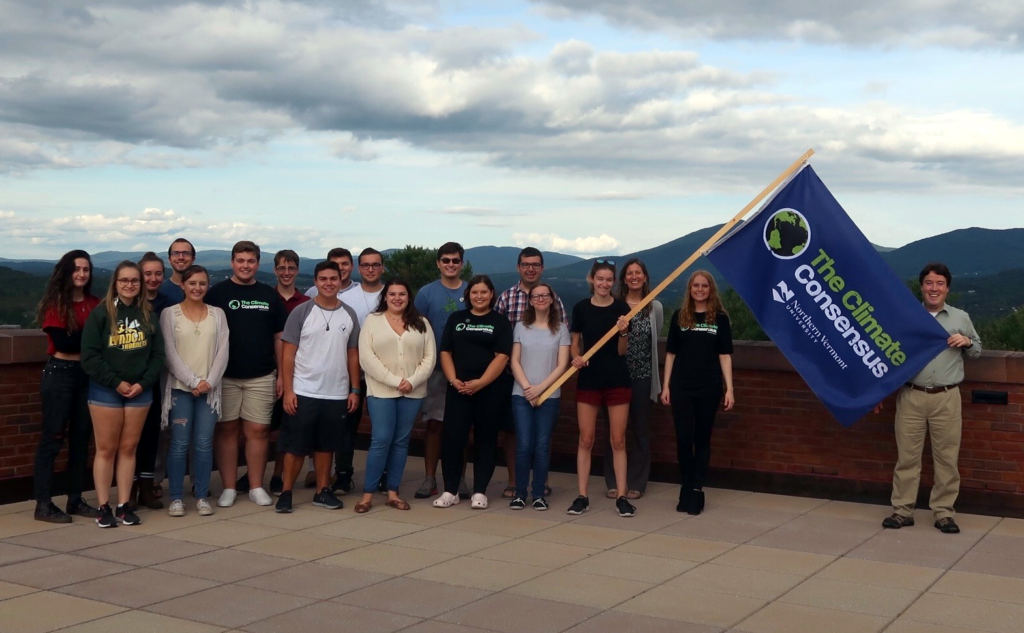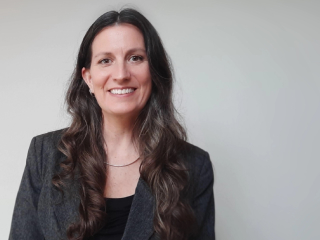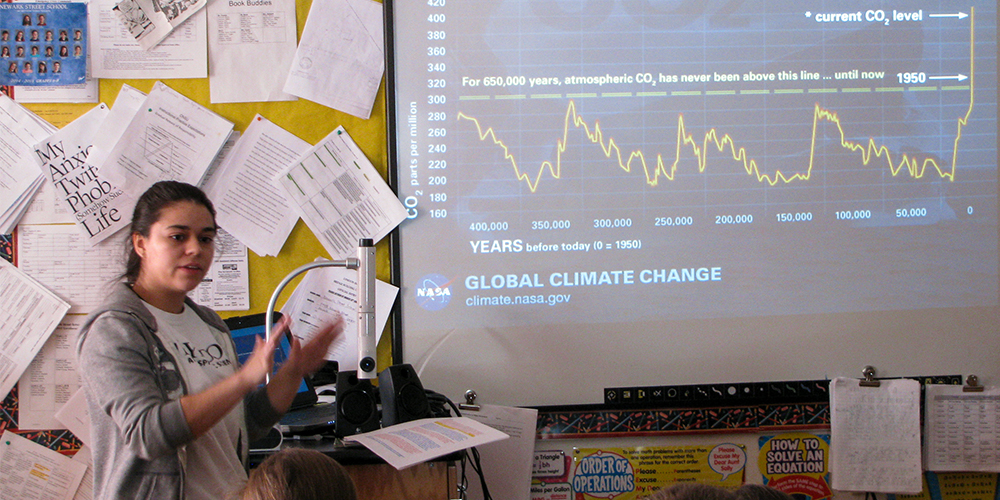Nearly all climate scientists agree that our planet is warming and human activity is the primary cause. In spite of this consensus, several studies have shown that the public does not recognize this general agreement among experts, nor do they understand the basics of climate change science. This understanding gap is significant because research shows that people are more likely to support policy actions to reduce carbon emissions if they acknowledge the overwhelming agreement among experts that humans are causing climate change.
At Northern Vermont University, we understand that climate change presents a monumental challenge for humankind. We think it is crucial for today’s scientists to educate the general public and key decision makers, instilling a sense of urgency for climate change mitigation. This kind of engagement is beyond the traditional scope of scientists and requires communication training, as well as a tremendous amount of passion and courage. Therefore, we provide many
The Climate Consensus group
The Climate Consensus group was established in 2014 by Lyndon students and faculty with two goals:
- To teach undergraduate students about effective ways to communicate basic climate change science to non-scientists, and,
- To improve public understanding of climate change science, and the consensus gap, moving us toward a more sustainable future.

The Climate Consensus website
In 2017, we launched a website called TheClimateConsensus.com with a mission of educating others about the real science behind climate change. The website provides a platform for students, scientists, and organizations to produce and distribute clear and engaging data visualizations, informed discussions, and research findings

Group meetings
The Climate Consensus group meets monthly during the school year to discuss climate change current events and their impacts, and to hone ways to effectively communicate these ideas to non-scientists. The group often invites guest speakers, like Northern Vermont Univerisity professor

Visits to local schools
Students in The Climate Consensus group have visited local schools (including Lyndon Institute, Newark Street School, Burke Town School, Danville School, and Woodstock Union School) to present programs about climate change science. Visits to Concord School and Danville School were covered by Lyndon’s News7 team. The group has worked closely with student members of the Lyndon AMS & NWA Club to serve as NOAA Weather-Ready Nation Ambassadors. Grade school students often are not exposed to climate change science, and these classroom interactions help them to understand important topics such as the greenhouse effect, rising oceans, and more. These visits also provide NVU-Lyndon students

Community outreach
Members of the Climate Consensus group have engaged in a variety of community outreach activities in Vermont, including a presentation to a local church, attendance at the Youth Rally for the Planet in Montpelier, as well as the Youth Environmental Summit in Barre, and the Burke Community Fair. They have organized public lectures and movie screenings for the Lyndon community. The group has even been invited to explain the science at town hall events to help inform policy decisions and local initiatives in the Northeast Kingdom.
Activism
At Lyndon, we think scientists should be part of the solution. Many of our students have participated in peaceful demonstrations to promote climate change action. For example, on April 29, 2017, twenty-four Atmospheric Sciences students joined over 200,000 others for the People’s Climate March in Washington, DC. The goal was to pressure world leaders to act on climate change, as a direct response to a distressing reality — that climate change is often talked about as a future problem, but it is actually a current problem.

In-class projects
Communication among experts is crucial for the advancement of scientific understanding, but communication with non-scientists is necessary for climate change action. Atmospheric Sciences courses provide a platform for young scientists to practice the important skill of informal climate change communication. Much of this work is highlighted on TheClimateConsensus.com
Presentations at national meetings
Interest in climate change communication is strong among higher education institutions across the country. Atmospheric Sciences faculty have highlighted student outreach efforts at regional and national conferences including the 2015 American Geophysical Union Fall Meeting, the 2017 American Meteorological Society Annual Meeting, and the 2018 Bridge/Work Conference at Valparaiso University. In January 2020, students in the Climate Change Consensus group were Town Hall panelists during the AMS 2020 Annual Meeting.

Climate Courage Awards and Scholarships
In recognition of our students’ outreach efforts, local Vermont residents have established the Climate Courage Award and the Climate Courage Scholarship. Annually, the Award is given to a graduating senior, and the Scholarship is given to a current student. Both recognize students who have accepted the responsibility to educate others about the urgency of climate change action, and have demonstrated this through their involvement with the Climate Consensus.
Why students participate in these efforts
“This is really important to me because I want to try and combat climate change in as many ways as I can…”
– Arianna Varuolo-Clarke, ’16 (founding student member)
“I wanted to educate the public on climate change in hopes that we may see a change in our agricultural system, fossil fuel consumption, and other areas that have a high impact on climate change.”
– Kayla St. Germain, ’15 (founding student member)
“…it is a huge problem that not enough people care about… You have to find a careful balance that makes them care without scaring them and I wanted to be a part of this challenge and this process.”
– Jacqueline Laviolette, ’15
“I love interacting with younger students because of their eagerness to learn, so being able to share my knowledge of climate change with them gives me a lot of joy.”
– Lauriana Gaudet, ’16
“The whole reason I am going to school is to learn how to keep the planet a better place for people after me by using science. Climate change communication is a huge part of this.”
– Melissa Segall, ’16
“I joined CCC to learn more about climate change and how to communicate it to the general public. I also wanted to get to know others who had similar interests.”
– Allison LaFleur, ’16
“The group has helped me learn more about climate change and I’ve been able to use a lot of the information learned form the group when talking to friends and family about climate change.”
– Jeremy Sousa, ’17
“I feel more confident about my understanding of climate change, so I feel more comfortable asserting and explaining myself in conversations.”
“The more I discuss and answer questions on climate change to an audience of non-scientists, the more comfortable I become in presenting and answering questions.”
“Instead of shying away from this controversial topic, I now welcome conversations about climate change from my family and friends who do not ‘believe’ in climate change.”
Looking for additional info? Contact us!

Janel Hanrahan
Associate Professor of Atmospheric Sciences
Chair, Department of Atmospheric Sciences | Director, The Climate Consensus
Education:
B.A. – Mathematics, Alverno College (2005)
M.S. – Mathematics, University of Wisconsin-Milwaukee (2008)
Ph.D. – Mathematics, University of Wisconsin-Milwaukee (2010)




